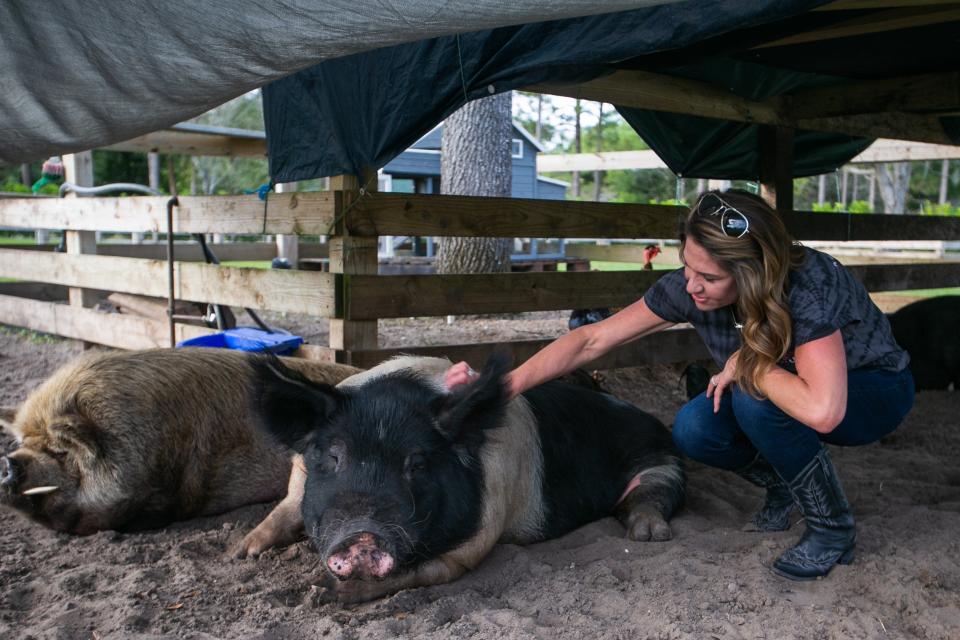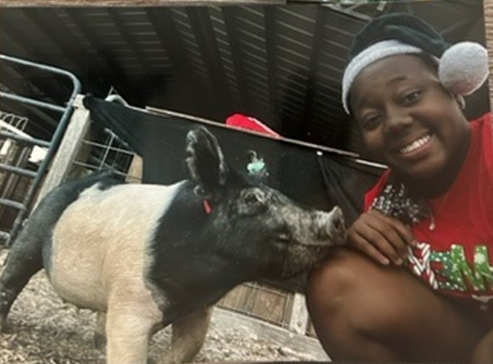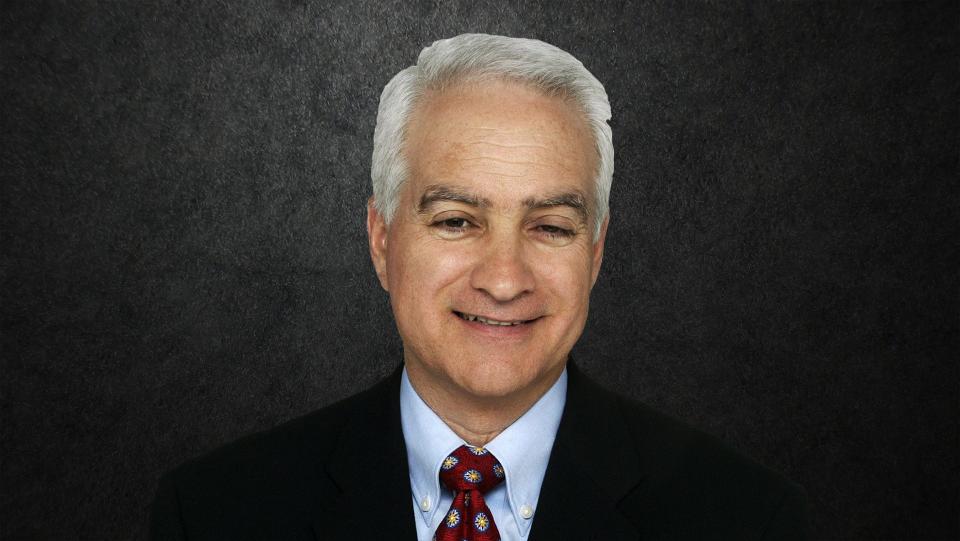Cautionary hog tale from fair: Do we really want to name animals we're about to eat?
A hog auction at the South Florida Fair got a lot of attention this month because the winner thought she was taking home a live pet instead of 186 pounds of butchered pork.
The story of Meg Weinberger’s winning $4,700 bid on the 250-pound hog, Bella B. Swine, is a cautionary tale of our time.
Weinberger and her husband run a 15-acre animal rescue sanctuary in suburban West Palm Beach, and they imagined a hog from the fair would be a nice addition to their menagerie of animals at their Rescue + Life refuge.
Hog auctions are an annual feature at the South Florida Fair in suburban West Palm Beach. Kids raise the animals with the idea that they will one day be sold for slaughter.
Bringing home the bacon? Couple bid on pig at fair hoping for a pet, but it was scheduled for slaughter
More:Best crazy foods at the 2023 South Florida Fair in West Palm Beach
Cerabino: Woke or joke? Trying to feel the pain of straight, white men

Is it a pet or a protein? Depends on your outlook
So, what we have here is a collision of world views.
On one side, you’ve got people who see hogs as smart creatures who ought to live in peace, and on the other, you have the ones who see them as beasts moving toward their inevitable destiny as food.
It can get confusing when you give the protein affectionate names. People name pets as a sign of love and companionship, not so they can recall an animal’s face while they’re gnawing on its ribs.
There wouldn’t have been any confusion at the auction if Bella B. Swine was named Meat Source Unit 13287.
The chicken named Colin
It reminds me of a great scene in Portlandia, a TV comedy that made fun of socially aware young adults. In one episode, the characters played by Fred Armisen and Carrie Brownstein go to a restaurant.
The waitress asks them if they have any questions about the menu.
“I guess I have a question about the chicken,” Brownstein says. “If you can tell us a little more about it.”
The waitress mentions the breed of the chicken and the diet it had been fed, which includes sheep's milk, soy and hazelnuts. It’s organic, local and while it was alive, the chicken had roamed free on four acres of land, the waitress says.
The waitress then returns with a folder on the chicken they would be eating.
“His name is Colin,” the waitress says, as she hands over “his papers” with a photo of Colin attached by a paperclip.
“He looks like a happy little guy with a lot of friends,” Armisen says.
He asks the waitress if Colin liked to “put his little wing around” other pal chickens at the farm.
“They do a lot to make sure that their chickens are very happy,” the waitress says.
“When you say ‘they’, who are these people raising Colin?” Brownstein asks.
It’s a farm 30 miles south of Portland, the waitress says.
“And you have a good relation with this farm?” Armisen says. “It’s not just a guy who lives on a yacht in Miami?”
In the end, the couple tell the waitress to hold their table at the restaurant while they drive to the farm to investigate Colin’s former living conditions before they order him for dinner.
Was livestock auction bidder confused or making a point?
Some people have suggested that the Weinburgers knowingly created a controversy over the hog at the fair by winning the auction with a $4,700 bid and then asking for the hog to be handed over to them live, not butchered.
But the Weinbergers said that had they known they weren’t going to get Bella B. Swine in its living state, they wouldn’t have participated in the auction.

“The last thing we wanted to do was to send Bella to the slaughterhouse,” Eric Weinburger said. “They would not take our credit card when we said we wanted to take her home.”
Why not? The fair’s position is that the written language of the bidding identified it as a “terminal auction.”
“Terminal auction” is a euphemism that sugarcoats what’s going on here.
You can tell how awful something is by the number of euphemisms that are created to obfuscate the true meaning of things.
Euphemisms are all around us: Pre-owned cars, rainbow bridges, “cozy” houses for sale, big-boned people, special military operations, correctional facilities, people who “pass gas” and others who are “between jobs.”
I guess we’ll have to add “terminal auctions” at the fair to that list.
The fair’s adamance that the winner of the hog auction must accept a butchered animal rather than a live one strikes me as defensive.
It seems to have more to do with validating the recruitment of children to raise animals for slaughter than the stated argument that Bella B. Swine wasn’t raised to be around other animals.
Wouldn’t want the kids to feel bad for thinking of these animals as anything but protein.

I say this as a fully-fledged member of the meat hypocrites. I eat pork and other meats between brief periods of vegetarianism for both health and moral reasons — especially after watching videos of factory farming.
So whether the Weinbergers pulled a stunt or not is beside the point. They did everyone a favor.
It’s worth being confronted to consider the animals we kill for food. Especially after giving them cute names.
Frank Cerabino is a columnist at The Palm Beach Post, part of the USA TODAY Florida Network. You can reach him at fcerabino@gannett.com. Help support our journalism. Subscribe today.
This article originally appeared on Palm Beach Post: South Florida Fair auction: Family bid on pig for pet, not bacon

